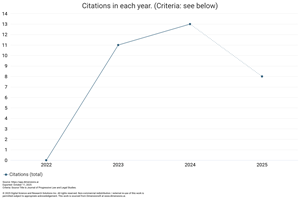Removal of Infected Muslim Body Covid-1 According to MUI Fatwa No. 18 Years 2020
DOI:
https://doi.org/10.59653/jplls.v2i01.569Keywords:
pandemic, COVID-19, MUI fatwa no.18 of 2020, corpse, managementAbstract
As a result of the COVID-19 pandemic, infected individuals have spread far and fatally affected a significant number of people. Indonesia is fearful and nervous about getting COVID-19. Even when COVID-19 patients have passed away, the virus can still spread to others who come into contact with a dead body. The qualitative, statutory, and normative research approach used to write this thesis is library research (library research) based on secondary sources. A qualitative investigation was carried out on the numerous documentary studies that have been done, which were done by looking through and perusing a variety of literature. Qualitative data is descriptive in nature, meaning it is gathered using words rather than statistics. The study's findings indicate that managing Muslim bodies infected with Covid-19 differs from handling corpses in general and calls for specific handling in accordance with MUI fatwa no. 18 of 2020 for managing the bodies of Muslims infected with Covid-19, in order to prevent infection of the general public and law enforcement personnel performing their duties.
Downloads
References
Ahmed, A. S., & Taufiq, M. (2021). Manâfidu al-Muharramât ilâ Muntijâti al-Halâl: “Dirâsah Tahliliyah fi Dhaw’i Ma’âyir Majma’’ al-Fiqh al-Islâmi al-Dawli wa al-Ma’âyir al-Mâlayziah".” Al-Ihkam: Jurnal Hukum Dan Pranata Sosial, 16(1). https://doi.org/10.19105/AL-LHKAM.V16I1.3050
Alenazi, T. A., Shaman, M. S. B., Suliman, D. M., Alanazi, T. A., Altawalbeh, S. M., Alshareef, H., Lahreche, D. I., Al-Azzam, S., Araydah, M., Karasneh, R., Rebahi, F., Alharbi, M. H., & Aldeyab, M. A. (2023). The Impact of Multidrug-Resistant Acinetobacter baumannii Infection in Critically Ill Patients with or without COVID-19 Infection. Healthcare (Switzerland), 11(4). https://doi.org/10.3390/healthcare11040487
Anwar, Y. K., Zulbaedah, Syarifudin, D., & Mahbub, M. (2020). ’Azimah, Rukhshah dan Raf’u Taklif dalam Pelaksanaan Tuntutan Hukum Ibadah Ketika Terjadi Wabah Virus Covid-19. Karya Tulis Ilmiah Dosen Fakultas Syariah Dan Hukum UIN Sunan Gunung Djati Bandung.
Asman, & Muchsin, T. (2021). Maqasid al-Shari’ah in Islamic Law Renewal: The Impact of New Normal Rules on Islamic Law Practices during the Covid-19 Pandemic. Mazahib Jurnal Pemikiran Hukum Islam, 20(1). https://doi.org/10.21093/mj.v20i1.2957
Büyükşireci, D. E., Türk, A. Ç., Erden, E., & Erden, E. (2023). Evaluation of pain, disease activity, anxiety, depression, and neuropathic pain levels after COVID-19 infection in fibromyalgia patients. Irish Journal of Medical Science, 192(3). https://doi.org/10.1007/s11845-022-03081-z
Chuang, Y. T., Chiang, H. L., & Lin, A. P. (2023). Investigating the serial psychological processes of workplace COVID-19 infection risk and employees’ performance. Current Psychology. https://doi.org/10.1007/s12144-023-04583-4
Durbin, P. M., Viana, G., Allareddy, V., Kusnoto, B., Ravindran, S., Kadkol, S., & Atsawasuwan, P. (2023). COVID-19 infection rates and mitigation strategies in orthodontic practices. BMC Oral Health, 23(1). https://doi.org/10.1186/s12903-022-02705-1
Gulakala, R., Markert, B., & Stoffel, M. (2023). Rapid diagnosis of Covid-19 infections by a progressively growing GAN and CNN optimisation. Computer Methods and Programs in Biomedicine, 229. https://doi.org/10.1016/j.cmpb.2022.107262
Hapid, M. H., & Dewi, T. S. (2023). COVID-19 Infection as an Exacerbated Factor of Oral Candidiasis in HIV/AIDS Patient. International Medical Case Reports Journal, 16. https://doi.org/10.2147/IMCRJ.S407597
Kurogi, K., Ikegami, K., Ando, H., Hino, A., Tsuji, M., Igarashi, Y., Nagata, T., Muramatsu, K., & Fujino, Y. (2023). Evaluation of workplace infection prevention and control measures for COVID-19: A prospective cohort study in Japan. Heliyon, 9(5). https://doi.org/10.1016/j.heliyon.2023.e15996
Leite, J., Abreu, A. C., Furtado, M. J., & Lume, M. (2023). Retinal Changes After COVID-19 Infection and COVID-19 Vaccination. International Medical Case Reports Journal, 16. https://doi.org/10.2147/IMCRJ.S408306
Mohseni, H., Amini, S., Abiri, B., Kalantar, M., Kaydani, M., Barati, B., Pirabbasi, E., & Bahrami, F. (2021). Are history of dietary intake and food habits of patients with clinical symptoms of COVID 19 different from healthy controls? A case–control study. Clinical Nutrition ESPEN, 42. https://doi.org/10.1016/j.clnesp.2021.01.021
Narang, K., Miller, M., Trinidad, C., Wick, M., Thieler, R., Weaver, A. L., Mehta, R. A., & Schenone, M. (2023). Impact of asymptomatic and mild COVID-19 infection on fetal growth during pregnancy. European Journal of Obstetrics and Gynecology and Reproductive Biology, 281. https://doi.org/10.1016/j.ejogrb.2022.12.020
Noori, A. Q. (2021). The impact of COVID-19 pandemic on students’ learning in higher education in Afghanistan. Heliyon, 7(10). https://doi.org/10.1016/j.heliyon.2021.e08113
Rohim, A. N. (2022). Dharurah and the Realization of Maqashid Sharia: Analysis of the Implementation of Islamic Legal Maxims on Emergency. Nurani: Jurnal Kajian Syari’ah Dan Masyarakat, 22(1). https://doi.org/10.19109/nurani.v22i1.11449
Türk Börü, Ü., Köseoğlu Toksoy, C., Bölük, C., Demirbaş, H., & Yılmaz, A. Ç. (2023). A case of Guillain-Barré syndrome related to COVID-19 infection. International Journal of Neuroscience, 133(1). https://doi.org/10.1080/00207454.2021.1886097
Wu, C., He, C. yan, Yan, J. ran, Zhang, H. li, Li, L., Tian, C., Chen, N., Wang, Q. yi, Zhang, Y. hai, & Lang, H. juan. (2023). Psychological capital and alienation among patients with COVID-19 infection: the mediating role of social support. Virology Journal, 20(1). https://doi.org/10.1186/s12985-023-02055-6
Downloads
Published
How to Cite
Issue
Section
License
Copyright (c) 2023 Fakhrurazi Fakhrurazi, Adlia Marshinta, Hasanah Aulia, Rajiv Nazry Faizullah Sina Gula, Wawan Setiawan, Okta Rosfiani

This work is licensed under a Creative Commons Attribution-ShareAlike 4.0 International License.
Authors who publish with this journal agree to the following terms:
- Authors retain copyright and grant the journal right of first publication with the work simultaneously licensed under a Creative Commons Attribution-ShareAlike that allows others to share the work with an acknowledgement of the work's authorship and initial publication in this journal.
- Authors are able to enter into separate, additional contractual arrangements for the non-exclusive distribution of the journal's published version of the work (e.g., post it to an institutional repository or publish it in a book), with an acknowledgement of its initial publication in this journal.
- Authors are permitted and encouraged to post their work online (e.g., in institutional repositories or on their website) prior to and during the submission process, as it can lead to productive exchanges, as well as earlier and greater citation of published work (See The Effect of Open Access).
























